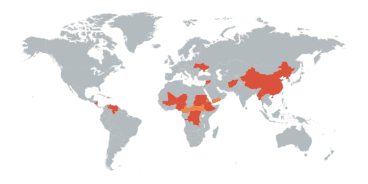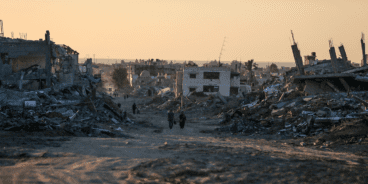
Déjà vu in the Central African Republic as the UN Looks to Intervene
This article written by Evan Cinq-Mars was originally published in International Peace Institute’s Global Observatory. Original version available here.
In a December 1998 report to the United Nations Security Council, former UN Secretary-General Kofi Annan happily reflected on a crisis in Africa where the world body had done well. A UN peacekeeping operation had taken over from an African-led, French-supported force, and contributed to the stabilization of a dire political and security situation in the Central African Republic (CAR). “As a result of the involvement of the United Nations,” the Secretary-General extolled, “the Central African Republic has become an island of relative stability in an otherwise wartorn region.”
Fifteen years later, the Security Council is once again seized with a collapsing Central African Republic. Though the situation is markedly worse now, with warnings of the risk of genocide ringing out from New York, Paris, and Washington, a looming feeling of déjà vu is taking hold as the UN, the African Union, and the French scramble to prevent CAR’s descent into anarchy.
Back in 1996, three army mutinies against a weak CAR government led central African states to deploy the Inter-African Mission for the Surveillance of the Bangui Accords (MISAB). The UN Security Council approved MISAB’s deployment in August 1997 under Chapter VII of the charter, and called for greater support from the international community. Paris provided the majority of assistance to the operation, and increased its troop presence in the capital, Bangui.
Yet France grew weary of the cost of its presence on the African continent and decided to scale back in CAR in late 1997. This left the UN to deal with a fledgling African mission that could not fulfill its mandate without the French. As a result, Secretary-General Annan reported to the Security Council in January 1998 that the “only viable option” was the establishment of a UN peacekeeping operation in CAR. MINURCA was eventually deployed in March 1998, and by 2000, after a marked improvement in the country, the UN operation was drawn down.
Fifteen years later—and almost fifteen years to the day of Annan’s “island of stability” remark—the African Union is poised to assume responsibility for the African-led International Support Mission in CAR (MISCA) on December 19, 2013.
Today, December 5, the Security Council is set to pass a resolution that will give MISCA authorization under Chapter VII of the UN Charter, just as it did with MISAB in 1997. The Council will also call for increased financial and logistical support to MISCA (a similar call was made for MISAB).
France will again need to play a critical enabling role in CAR, but similar concerns from 1998 are also arising. France is fresh off leadership roles in recent interventions in Libya and Cote d’Ivoire, and is still fighting in Mali. While Paris seems intent on increasing its troop presence in CAR, signals from the capital seem to suggest that it is only intent on a short term scale-up. During a “Peace and Security in Africa” summit in Paris on December 6-7, the French will reportedly make clear they cannot continue to serve as Africa’s policeman.
There is also a need for another UN peacekeeping operation in CAR. In November, UN SecretaryGeneral Ban Ki-moon recommended a force of 6,000 to 9,000 to stabilize the country. Members of the Security Council are in agreement that a UN operation is needed, but are split over timing.
Here again, the past may inform the present. MINURCA’s deployment came fourteen months after the establishment of the African-led MISAB in February 1997. The same time frame seems a distinct possibility today, given the desire for the African Union to prove itself in CAR and the Council’s affinity for “African solutions to African problems.”
The past is clearly informing the present in the response to the situation in CAR. But it begs an important question: Is it the right course of action?
CAR has typically suffered from neglect until a last-minute intervention is needed. The French have launched seven operations in CAR since 1960–an average of one intervention per decade. MISCA will be the third multilateral African-led force deployed in CAR since 1998 (South African troops were also deployed ahead of the March 2013 coup). A future UN peace operation will be the second in just over fifteen years, not including an additional UN operation in CAR and neighboring Chad that was deployed alongside a European Union force between 2007 and 2010. None of these operations, whether taken independently or with substantial international support, have had success in inoculating CAR against perpetual collapse.
While this series of ad-hoc interventions by the international community has not been able to stabilize CAR, there is still an opportunity to do so. The Security Council is currently hedging its bets on the African-led MISCA and French forces to do the job. There is certainly a chance that the two can have an impact: Rebels terrorizing Bangui have reportedly fled the capital with the news of the French deployment.
There are nonetheless serious risks with this combination. The UN has noted that MISCA will continue to face significant challenges even with increased international support, and the French are keen on a quick deployment. What happens if the African Union cannot muster the troops or if the number of French troops is insufficient? What if financial and logistical support is delayed or insufficient? What does the UN Security Council do if the French scale-back in CAR before MISCA is fully deployed and capable? What if the situation worsens substantively? The Security Council must be ready to respond if these very plausible scenarios arise.
UN peacekeeping operations are not silver bullet solutions. But a robust, well-equipped force is the best option in light of the gravity and complexity of today’s crisis, the constraints of the African Union and the French, and the serious need for a long-term solution to CAR’s woes.
The Security Council should not rest on the laurels of the past and wait a year to deploy a UN force. Six months is an entirely achievable timeline if the Council throws its full, clear support behind the UN Secretariat to begin planning and preparations. Donors could step in to support MISCA in the interim, and within six months, the African Union force could form the strong core of a multidimensional UN peacekeeping force that is capable and willing to protect civilians and bring CAR back from the brink.
Restoring the immediate security situation would be the first step in breaking the cycle of rebellion, coups, and counter-coups that have wracked CAR since its independence. Disarmament, demobilization and reintegration efforts and security sector reform initiatives have to be meaningfully implemented. The government and judiciary are broken, and an inclusive and lasting political solution is a priority. Accountability and reconciliation will be necessary tasks to heal a scarred country.
There is no doubt that undertaking these tasks will require a long-term commitment from the international community. Making the investment today makes much more sense than continuing with the trend of neglect until money must be thrown at last-minute interventions in CAR. The international community has a unique opportunity to learn from the past, rectify its missteps, and usher in lasting peace in CAR. This is the investment that the Central African Republic so desperately needs and deserves.
Related Content


